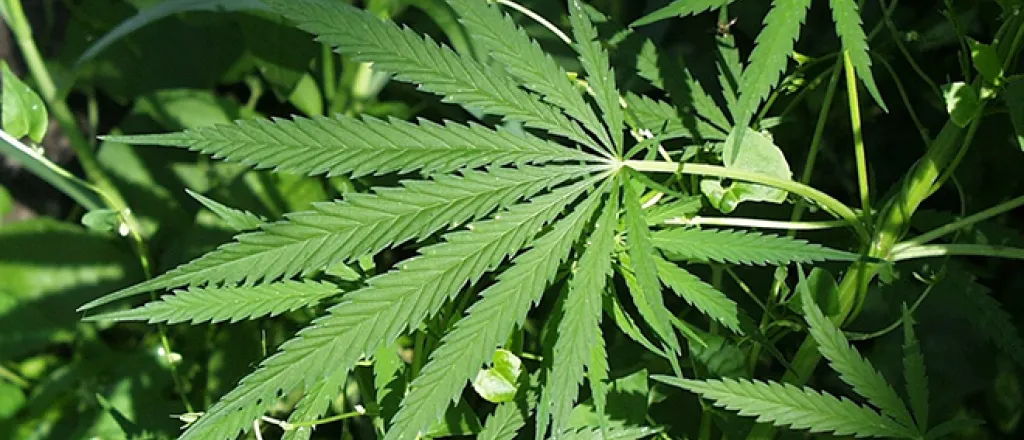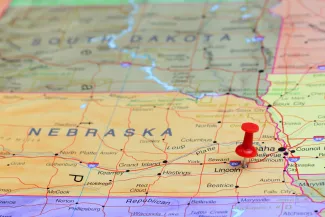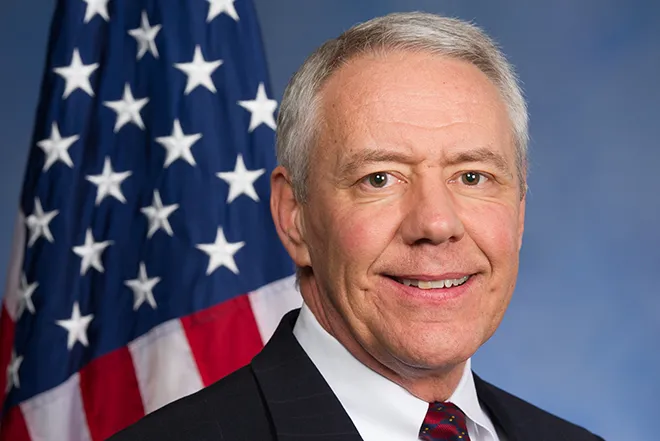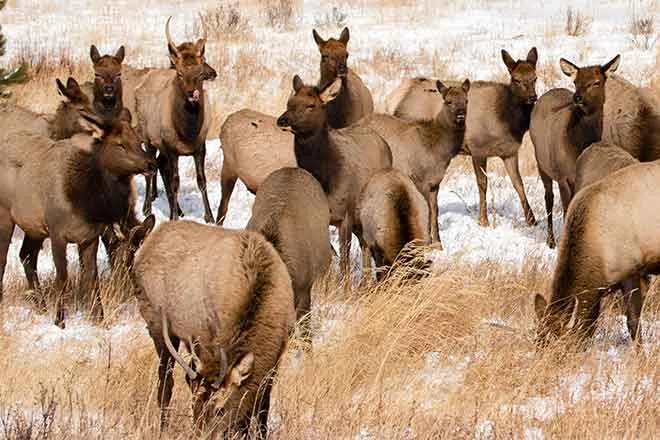
Omaha Tribe moves ahead with marijuana, accuses Nebraska AG of ‘retaliation’ in tobacco tax talks
The Omaha Tribe of Nebraska is moving ahead with legalizing marijuana, a move the tribe’s attorney general says Nebraska officials used to suspend negotiations on an unrelated state-Tribal tobacco tax compact.
The tribe called the move “direct retaliation.”

Omaha Tribe Attorney General John Cartier said an assistant attorney general for the state called him Monday, an hour before the first meeting of the tribe’s cannabis commission. Cartier learned state officials would no longer negotiate on a tobacco tax compact because of the tribe’s more permissive position on marijuana.
The Omaha Tribe Council unanimously voted in July to legalize medical cannabis and adult-use recreational marijuana. The initial focus of the tribe’s cannabis commission is “strictly” medical cannabis.
“It made me pause for about 30 seconds there, because I wasn’t really anticipating that level of obstruction,” Cartier told the Nebraska Examiner on Thursday. “I at least appreciated the candor and upfrontness about it.”
If a tobacco tax compact is greenlit, the state and tribe could split tax revenues from tobacco sales on the reservation. It could be a potential new windfall of hundreds of thousands of dollars for the tribe.
The Omaha Tribe reservation is in northeast Nebraska, more than 300 square miles, primarily in Thurston County and parts of neighboring Burt and Cuming Counties.
‘Direct retaliation’
In a follow-up conversation with Attorney General Mike Hilgers this week, Cartier said Hilgers indicated his office would confirm the state’s official position and how Governor Jim Pillen wanted to proceed.
Pillen asked Hilgers this summer to negotiate the contract on behalf of the State of Nebraska. The AG’s Office declined to comment on compact negotiations. Pillen’s office did not respond this week to questions about the dispute.
Cartier said he anticipates no change because “none of them fundamentally believe in a cannabis industry.” He said the AG’s Office has also indicated it plans to spend additional tax dollars in support of more policing of the Omaha Tribe’s border, because of the new tribal law.
“If that is their official stance, in our opinion, that’s direct retaliation, potentially a legal way for them to skirt their responsibilities and to use this as leverage,” Cartier said.
Cartier added: “People need to understand that they are still fighting bitterly to the very end on this topic, even though I think Nebraska voters have spoken, and they should honor that.”
‘Two plus two is four’
Voters in November 2024 overwhelmingly voted to allow someone to possess up to 5 ounces of medical cannabis with a physician’s recommendation. Voters also created a new state commission to regulate the new medicine. The state commission’s rules would ultimately allow medical cannabis to be purchased in the state, a milestone not expected until at least mid-2026.
Hilgers has argued that cannabis should remain illegal because federal law classifies marijuana as a Schedule I drug — a drug the federal government says has a high potential for abuse and no accepted medical uses. A bipartisan swath of advocates has called for rescheduling the drug for decades.

© iStock - Nikolay Evsyukov
Congress has repeatedly prohibited the U.S. Department of Justice from interfering with state medical cannabis programs. Advocates, including those in Nebraska, have pointed to the Tenth Amendment to the U.S. Constitution in upholdingstates’ rights to legalize marijuana.
“I think two plus two is four, even if everyone else says two plus two is five,” Hilgers said in May.
Pillen argues he has always supported medical marijuana but wants it to be strictly regulated to prevent a slide to legalizing recreational use. In September 2023, as advocates geared up for a third and ultimately successful petition campaign, Pillen said access to medical cannabis should only come with approval from the U.S. Food and Drug Administration. That hasn’t yet happened.
Nebraska followed dozens of other states in passing its medical cannabis laws in 2024, a nationwide push Hilgers recognizes as part of voters’ frustrations. He has said it’s an “abject failure” of the federal government not to enforce the laws it has created.
“I’m a big boy. It doesn’t bother me,” Hilgers, a former state lawmaker, said of opponents to his policy stance. “I’ve gone through the wars. What people want to say, they want to say.”
Hilgers’ office has not publicly commented on the tribe’s position on marijuana.
Negotiations began in July
Cartier said the Omaha Tribe reached out to Pillen in July to begin discussing a tobacco tax compact. The Santee Sioux Nation has such an agreement, which lets the Santee Sioux retain 75 percent of tobacco tax revenues. The Omaha Tribe says it seeks to keep 90 percent tobacco tax revenue while also taking on additional regulatory duties from the state, subject to negotiations.
State and tribal officials met in August related to a proposed tobacco tax compact, a meeting Cartier said was “highly productive” and left hope for “real progress.” The state promised to offer suggestions or a counterproposal within weeks.
“After months and months of promises and negotiations to be taken away from us at the last minute, it really is unconscionable to me,” Cartier said.
Cartier said it is easy to be rattled or emotional to a response like that, which he described as a continuation of government punishment of Native Americans “for just existing.” He said the Omaha Tribe is working to support its members and has passed a policy that could yield millions in economic development, plus job opportunities, without reliance on the federal government.
A contrasting tribal commission
Cheyenne Robinson, secretary of the Omaha Tribe Council, said Monday she was excited about the “historic day” for the Omaha people.
“We’re moving forward to committing to our sovereignty, having responsible regulation and economic diversification,” Robinson said. “Anxious for what’s to come.”
Jason Sheridan, chair of the Omaha Tribe Council, said Monday that all council members knew someone who could benefit from medical marijuana. He said he was glad the tribe was moving forward.
“I have nothing but confidence in all of you,” Sheridan told the commission.
The Omaha Tribe swore in four members to its own cannabis commission Monday — Jayzon Hundley, Amanda Hallowell, Arthur Isagholian and Allison Stockman. Cartier also sits on the commission as a nonvoting member. The tribe can seat up to one more member.
Hundley, grant accountant for the tribe, and Hallowell, a registered nurse, are enrolled members of the Omaha Tribe. Isagholian, with a background in agriculture, and Stockman, with a background in public safety and public health, bring about 40 years of experience in the cannabis sector in other states.
The inaugural meeting featured discussion on future commission rules and regulations, with a focus on how to test marijuana products for safety and navigate a potentially antagonistic state beyond its borders. One solution could be testing products on the reservation.
“Even if we think we have a legal right … they’re probably more than willing to fight that in the courts,” Cartier told commissioners Monday, referring to the Nebraska AG’s Office.
Cartier has said the tribe will defend its sovereignty and laws if and when needed. The commission will meet next Nov. 19, when it could approve its rules and regulations.
‘The driver’s seat’
State regulations from the Nebraska Medical Cannabis Commission, nearing final approval, have been criticized by many members of the public as overly burdensome. Among the restrictions are allowing up to 12 dispensaries statewide.
Nebraskans would need to receive a specific medical cannabis recommendation from a physician registered with the state medical cannabis program for access to a licensed state dispensary. Dispensaries could not sell smokable products, vapes, edibles or raw flower. No more than 5 grams of delta-9 tetrahydrocannabinol (THC), the part of cannabis most associated with a “high,” could be purchased every 90 days.
The state commission could seek to finalize its regulations and seek final approval from Hilgers and Pillen as soon as Monday.
Cartier said the tribe hopes to provide a “stark contrast” to the state regulations and promote access to medical cannabis, a topic he said “should have nothing to do” with tobacco taxes.
“We made a determination that now is a good point to bring this to the public, without waiting for a response from Attorney General Hilgers and the governor, because, in our perspective, we are not in the backseat on this,” Cartier said. “We’re in the driver’s seat, and we want to maintain that position.”

















